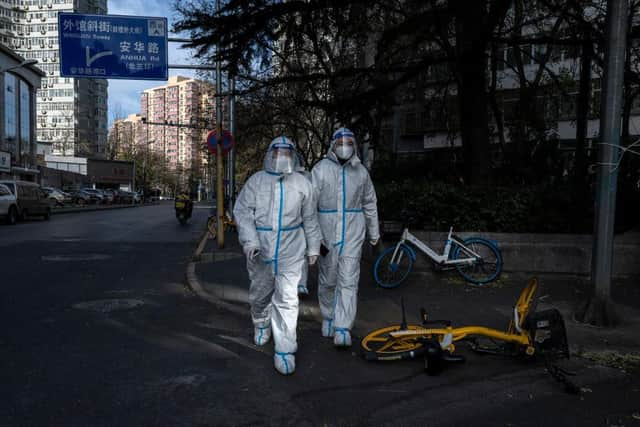UK summons Chinese ambassador over beating of BBC journalist in Shanghai
Reporter and cameraman Ed Lawrence was arrested by Chinese authorities and allegedly beaten during demonstrations on Sunday night. Video footage believed to be of Mr Lawrence being manhandled by Chinese police is circulating on social media. He was later released.
The Foreign Office has called ambassador Zheng Zeguang to Whitehall to “demand a full and thorough explanation” of Mr Lawrence’s detention, a department minister told the Commons.
Advertisement
Hide AdAdvertisement
Hide AdDavid Rutley said UK officials would make clear the “unacceptable and unwarranted” nature of the journalist’s treatment, after the BBC said he was “beaten and kicked” by police in the Chinese city.


China-sceptic Tory MPs urged the Government to “get serious” about Beijing and criticised Rishi Sunak’s plans to take a “robustly pragmatic” approach to country.
It came after the Prime Minister said in a speech at the Lord Mayor's Banquet in London on Monday night the so-called "golden era" of relations with China was over. Mr Sunak said he would "evolve" the UK's stance towards the country, warning the closer economic ties of the previous decade had been "naïve".
Answering an urgent question in the Commons, Mr Rutley said: “As the foreign secretary [James Cleverly] made clear yesterday, the arrest of a BBC journalist while covering the recent protests in Shanghai is a deeply disturbing and wholly unacceptable situation. Journalists must be able to do their job without fear of arrest or intimidation.
“The BBC has stated that the journalist was beaten and kicked by police during his arrest and was held for several hours before being released.
“In response, we are calling in the Chinese ambassador to make clear the unacceptable and unwarranted nature of these actions, the importance of freedom of speech, and to demand a full and thorough explanation.”
The BBC said the Chinese authorities had told them Mr Lawrence had been arrested “for his own good” to prevent him from catching Covid in the crowd.
Conservative former Cabinet minister Jacob Rees-Mogg questioned the impact of the summoning, saying: “Should we not be looking to expel diplomats, to take tougher action in international forums where Chinese interests are at stake, to do things that the Chinese would not want us to do … so that we show that we are not a pushover”
Advertisement
Hide AdAdvertisement
Hide AdAnother Conservative former minister, Tim Loughton, criticised the Government’s failure to expel the Manchester consulate general after a Hong Kong pro-democracy protester was allegedly attacked in the grounds of the Chinese consulate there.
Sir Iain Duncan Smith, the Tory former leader and long-standing China critic, raised doubts that Mr Sunak’s vision of “robust pragmatism” towards Beijing would “worry the Chinese any one bit”.
Widespread protests have broken out in China in a rare display of public defiance over stringent Covid lockdowns as part of the government’s “zero Covid” strategy.
Crowds in cities across the country have demanded the resignation of President Xi Jinping during protests against measures that confine millions of people to their homes, as cases of the virus rise in China. The demonstrations began after a deadly apartment fire in Xinjiang province sparked a national outcry as many blamed Covid restrictions for the deaths.
Zheng Zeguang, Chinese ambassador to the UK, said: “What really happened was that on the night of 27 November, to maintain public order, local police in Shanghai asked people who had gathered at a crossroads to leave. One of those at the scene was a resident journalist from the BBC. The journalist in the entire time did not identify himself as a journalist and refused to cooperate with the police’s law enforcement efforts. The police then had to take him away from the scene.
"After verifying his identity, the police allowed him to leave. Everything was conducted within normal law-enforcement procedures. The UK side is now falsely claiming that the journalist had been “arrested” and “beaten” by Chinese police. Such a groundless accusation is a distortion of the truth and malicious slander and is totally unacceptable to the Chinese side.”
Comments
Want to join the conversation? Please or to comment on this article.